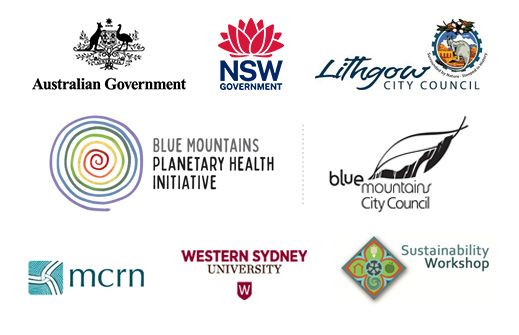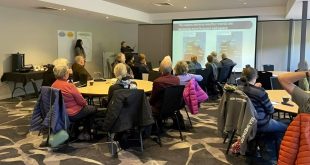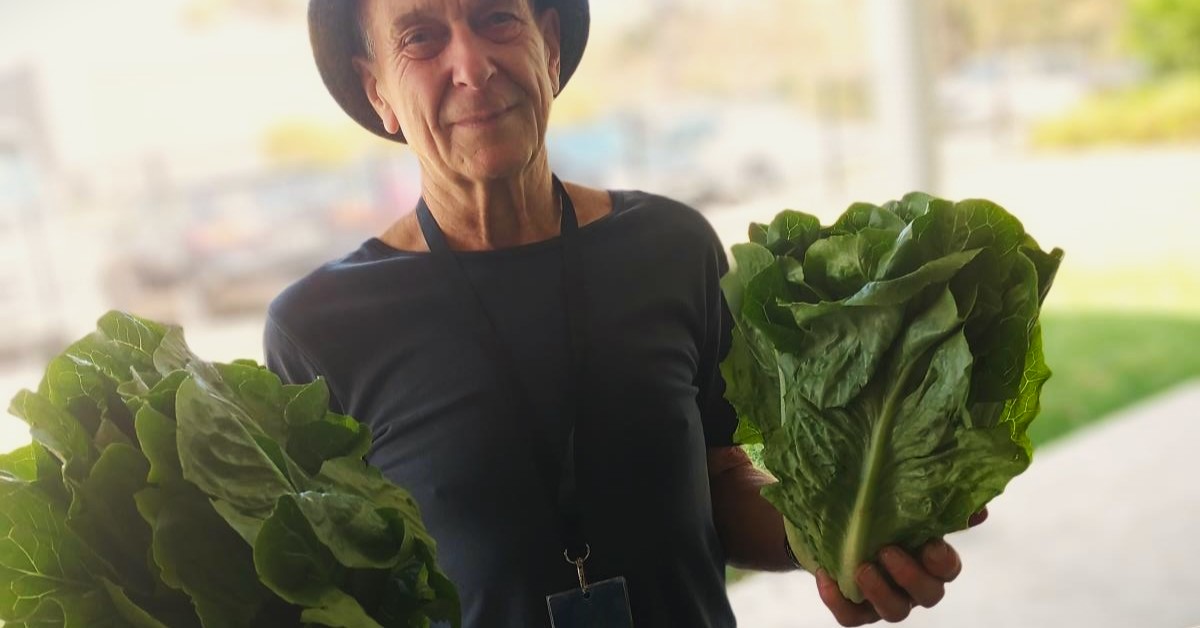
Anglican Church Volunteer Ralph sets up the fresh food tables, providing free fruit and vegetables purchased through donations. (Gabiann Marin)
Story by Gabiann Marin
Food wastage is one of the biggest problems in the developed world, contributing to overflowing landfill, climate change and food insecurity, but in the Lower Blue Mountains a number of volunteer and community organisations are finding innovative and effective ways to reduce food waste while helping locals access delicious fresh food and slash their grocery bills.
Committed to redirecting and sharing food that would otherwise end up in landfill, these small, grass roots organisations are at the forefront of the reclaimed food revolution. But what is reclaimed and extended life food and how does food redistribution help communities become resilient and connected?
Key Points:
- Over 7.6 million tonnes of food goes into landfill each year in Australia
- Much of this waste is avoidable, and a number of organisations are taking action
- A fortnightly event in Springwood is bringing the community together to make use of this food bounty
The melodious sounds of voices singing in unison fill the air as a woman looks around the room.
“There seem less people than usual,” she remarks to her friend. The woman beside her follows her gaze, noting the small groups of people sitting on the scattered couches and small tables around them. It looks fairly full, but the woman is right, compared to the other second Thursdays they have visited, The Factory in Springwood seems quiet.
As they watch, more people arrive: mothers with babies, elderly people in small groups. A man delivers a box of baked goods, which are quickly unpacked and presented on small plates, alongside steaming cups of tea and frothy flat whites. It feels more like a popular city café than a small community space in the industrial area of Springwood.
The music rises in volume slightly as the community singing group reach the crescendo of their song, the echo of their last shared note hanging in the air as they wander out of the adjacent room and into the large seating area. They join those who are already enjoying free chocolate chip cookies and deliciously moist raspberry muffins, all served by volunteers who turned up hours earlier to set up this event: just as they do every second Thursday – rain, hail or shine.
Outside, Ralph, a gentleman with a winning smile and an English accent has set out a rainbow of fresh, locally grown vegetables, which are free to anyone who would like to fill a bag with blueberries, potatoes, carrots or lettuce. On the far side of the interior room is a table full of items brought in by visitors, who can leave and take whatever they like from the variety of goods. The entire place is a physical manifestation of generosity and community.
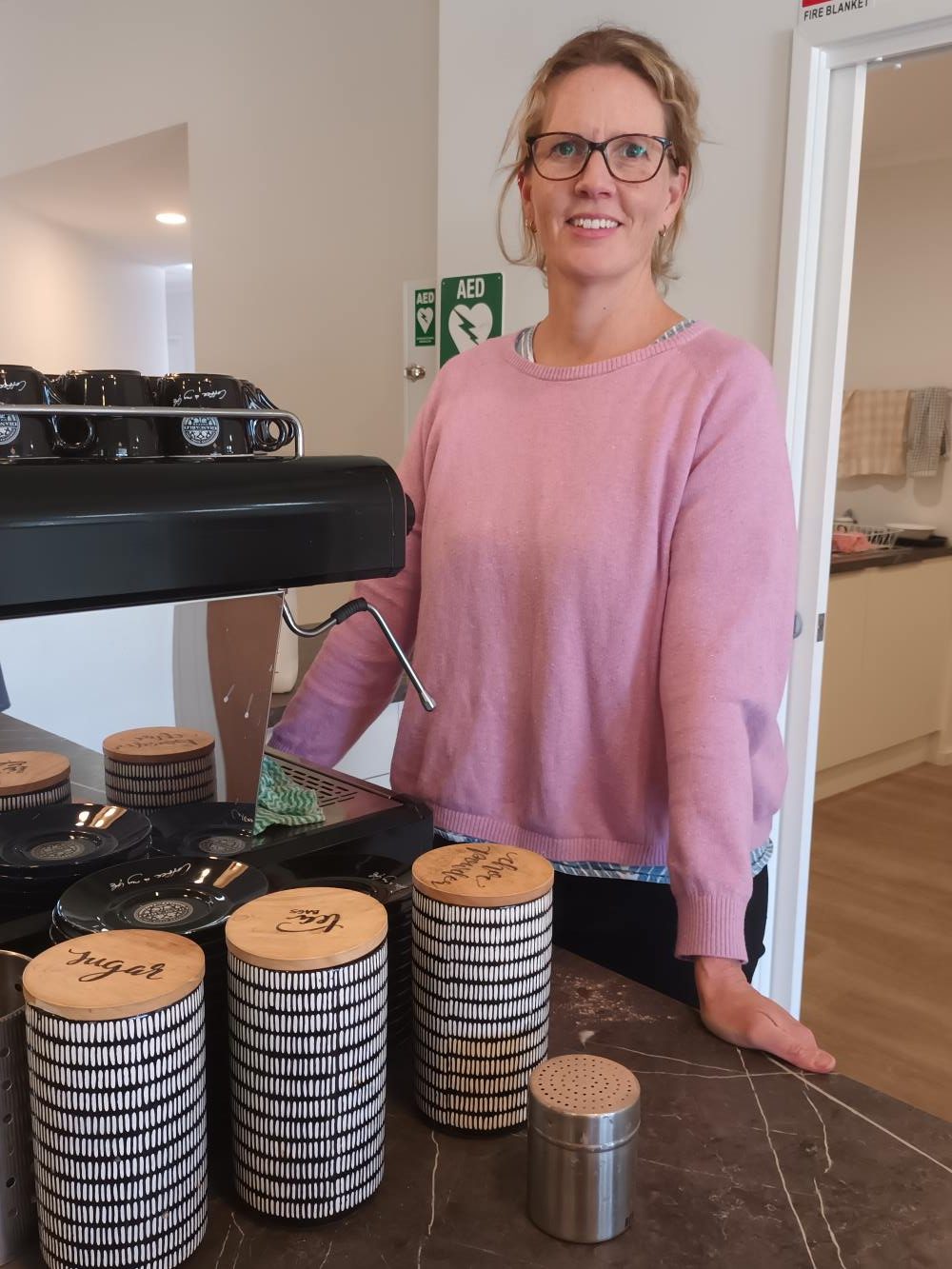
Justine Jenner, Organiser of The Pantry community event In Springwood. (Gabiann Marin)
Justine Jenner elegantly floats through the groups, greeting many of the visitors and all the volunteers by name. She has that soft calm quality so common in those who devote their lives to helping others. Her formal role is in women’s pastoral care for the Anglican Church in Springwood, but she does so much more, including organising and overseeing The Pantry – this fortnightly food sharing and community event, the heart of which is the arrival of the Anglicare Pantry Truck, a mobile community supermarket which offers high quality reclaimed groceries at highly subsided prices.
Visitors can purchase up to two bags for $12 each and fill them with an array of items available in the truck: everything from staples like cereal to luxury items like Swiss drinking chocolate. Almost all the groceries are reclaimed through Foodbank Australia, a not-for-profit organisation that collects donated and unwanted food and groceries from food retailers across Australia and redistributes them in multiple ways across communities. Anglicare then ensures the food is distributed as widely as possible by placing them in its mobile food trucks, which visit different communities throughout NSW on designated days of the month. Every second Thursday one arrives in Springwood, where a loyal group of locals happily await their turn to select their goods.
When Justine first proposed the idea of The Pantry in 2020, she wanted something that was available and accessible for the whole community. The Anglicare Pantry Truck has been established since 2016, and services over 52 local areas, but had no outlet in the Blue Mountains at that time, so Justine saw this as a good opportunity to create a service that could not just provide affordable food options, but also social connections for the local community.
Justine wanted to make a place where everyone felt welcome, not just those who might traditionally come to a church organisation.
We all need help to stretch our budgets further, so everyone is welcome here. – Justine Jenner
It’s a point clearly illustrated in the diversity of people currently chatting throughout the room: artists, students, families as well as the elderly and those on a fixed income happily mix together, sipping tea and playing with the toys and games that have been placed out in the communal space.
This is a service for neighbours, everyone in the community. Don’t feel like you can’t come, all kinds of people come. You are welcome. – Justine Jenner
In these tough economic times more and more people are taking up the invitation, realising the value of these kinds of services because, as Justine so clearly states, ‘If you can save on the staples then that is money you can put somewhere else.’
When COVID restrictions came into effect in late 2020, Justine was quick to re-organise the service so that the social element was still available, but took place mostly outdoors.
‘Because the underlying idea is about food, and access to food, we were allowed to keep running, we didn’t have to shut it down,’ Justine said. ‘We had to have a COVID plan around it, but it actually meant we could keep the social interaction going. So people could come out, do their shopping and stay connected.’
Volunteers worked to create food packages which could be picked up and distributed to those who were more vulnerable, but also provided a space for smaller COVID safe gatherings to help ease the sense of social isolation so many felt during that time.
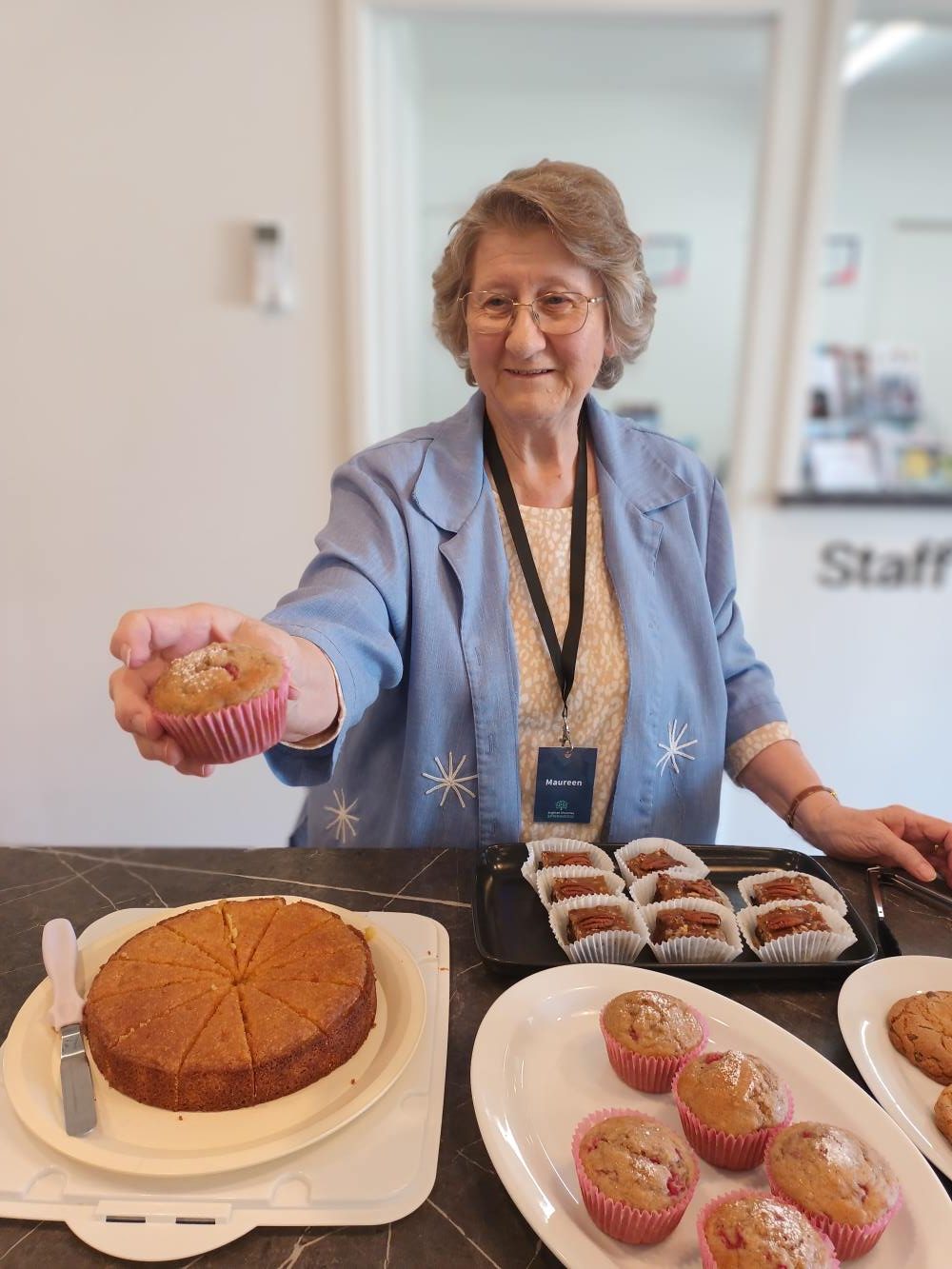
Pantry volunteer Maureen offers a tasty muffin, donated by a local bakery. (Gabiann Marin)
Justine considers this for a moment: ‘That is a massive part of what we do, the social aspect. It’s become a bit of a meeting place, the people who come don’t just meet the volunteers, they meet each other.’
Connection with community and providing a social outlet is foundational to the idea of The Factory, with Justine excited that now COVID restrictions are at an end they can expand their services beyond just the food sharing events.
The local singing group, which meets at the venue, was an indirect result of The Pantry, with a community member suggesting the idea to Justine. The singing group – Justine emphasises that it is nothing as formal as a choir, just a group of people who just like to sing – meet at The Factory at a time to coincide with The Pantry service and participants for both are growing in numbers. Justine is always keen to listen to community ideas and is pleased to add The Factory’s next community initiative: the Factory Art Prize which is currently calling for entries from visual artists across the Blue Mountains.
How the food service works
The subsidised food supermarket is, however, still the main drawcard and is open to anyone in the community who can make it down to the fortnightly event. Once there, getting the food is simple and far less stressful than queuing up at the local supermarket.
Customers arrive at The Factory anytime between 12 pm and 1.30pm on the fortnightly Thursday and register their interest. They are presented with a call number by smiling volunteers. Once registered they can wander over to the café counter where they can choose any of the delicious pastries or cakes donated that morning from local bake houses, as well as order a hot tea or coffee. Anyone visiting The Factory on this day can have a complimentary hot beverage and a chat, even if they aren’t buying groceries, and the volunteer barista standing behind the huge metal coffee machine offers coffee options that would make a café envious.
Then, coffee and cake in hand, they can simply relax as they await their number to be called, peruse the swap table or go and select from the fresh fruit and vegetable table. The fresh food, provided totally free of charge to anyone who would like it, is mostly purchased from local green grocers, although donations of fresh food from local gardens and small businesses is also welcomed.
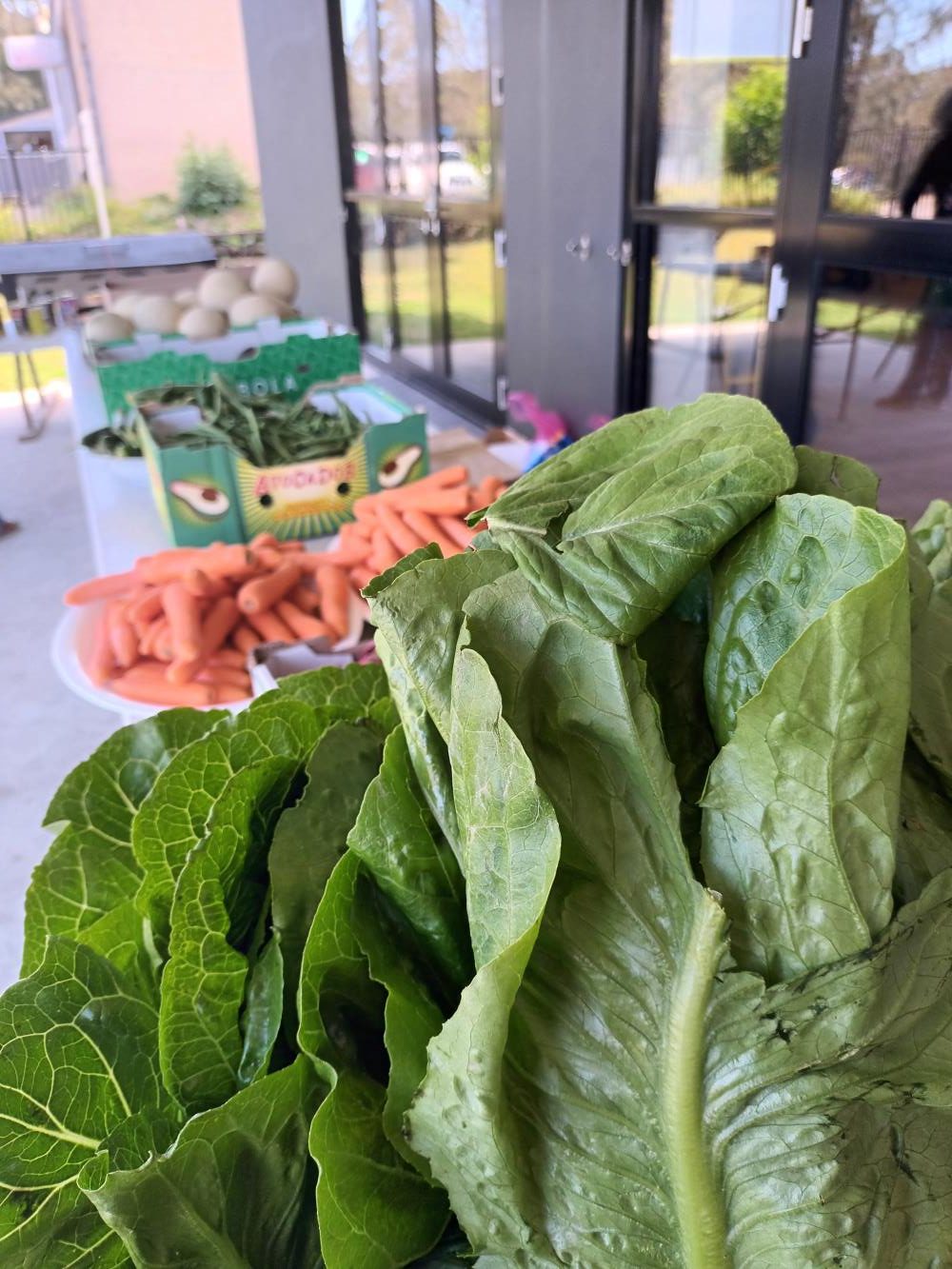
Fresh food is available to all at The Pantry Springwood every 2nd Thursday. (Gabiann Marin)
Justine believes it is important to have the fresh food options available and free for community as The Pantry offers more of the staple and processed foods. The fresh food and donated bread help ensure those using The Pantry get access to a range of healthy food options.
While the bread is donated by local bakeries, the funds to supply the fruit and vegetables were raised through a special fundraising initiative by the local Anglican congregation, who donated enough money to supply free fresh local green groceries every fortnight for the next year.
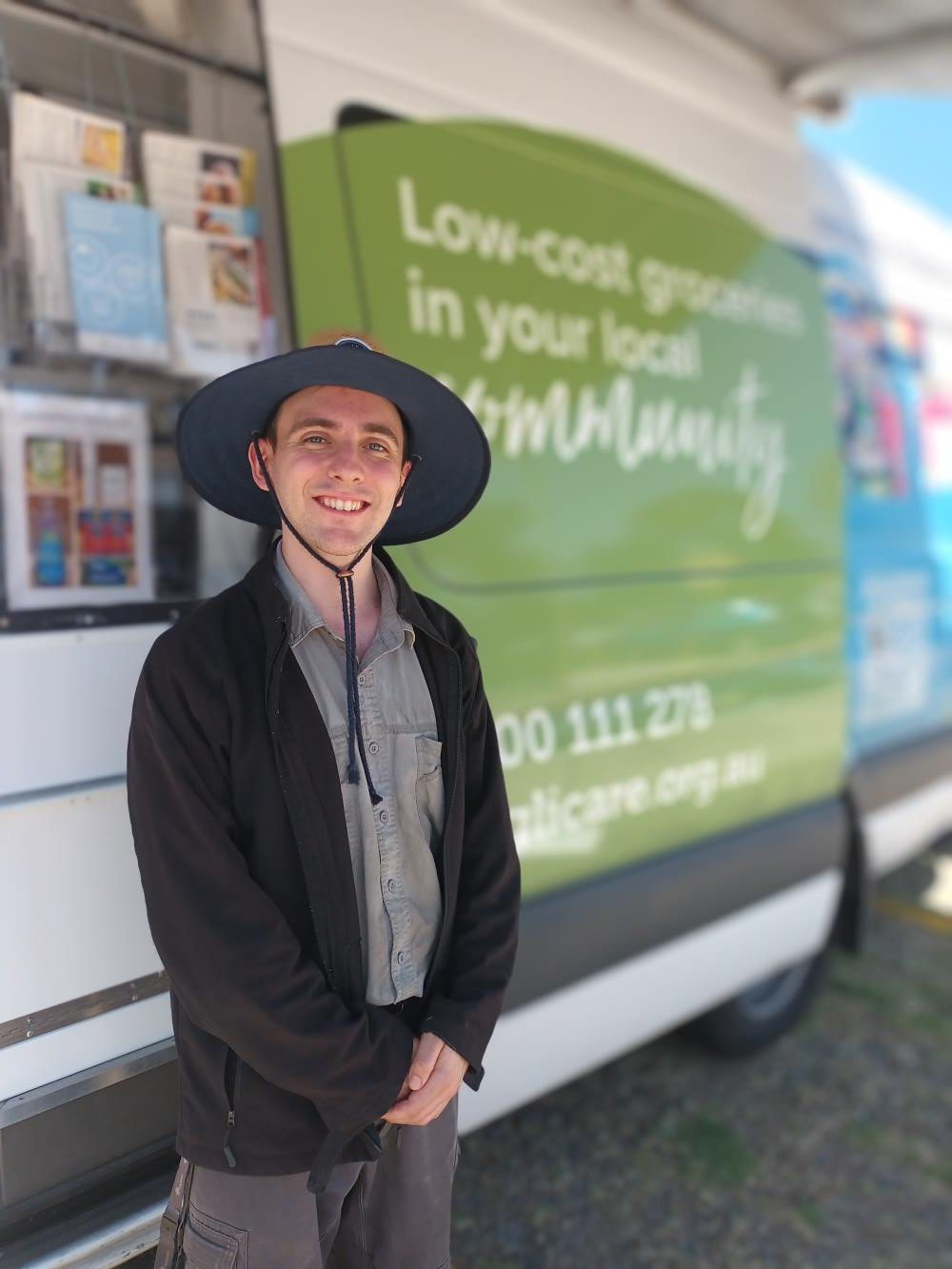
The Anglican Pantry Food Truck has been running since 2016 and services over 52 sites across NSW, including Springwood, providing subsidised groceries sourced from Foodbank Australia. (Gabiann Marin)
Once a number is called, it’s a short walk out to the waiting food van, a brightly coloured vehicle which opens up to reveal a compact and pretty impressive looking mobile supermarket. Christian, the Anglicare truck driver, greets people as they come to pay for their selected bags, explaining the process to any newcomers. Then they are able to select the items that most interest them from the available groceries on the shelves.
The selection is not as extensive as your traditional supermarket, and varies from week to week, but usually includes things like rice, flour, sugar, tea, cereals, sauces and pastas as well as treats like chocolates and muesli bars.
The shopping experience has a nostalgic vibe, as a friendly volunteer reaches up to snag a box of tea bags or a packet of noodles and hands them over, chatting happily. Another volunteer is on hand to help carry bags to the car if needed, or guide those who need help to the van. It’s reminiscent of the old corner shops where communities could engage not just in retail but also social exchanges, a far cry from the often rushed, sterile and impersonal supermarket shopping experience, where you are more likely to engage with a machine than a person.
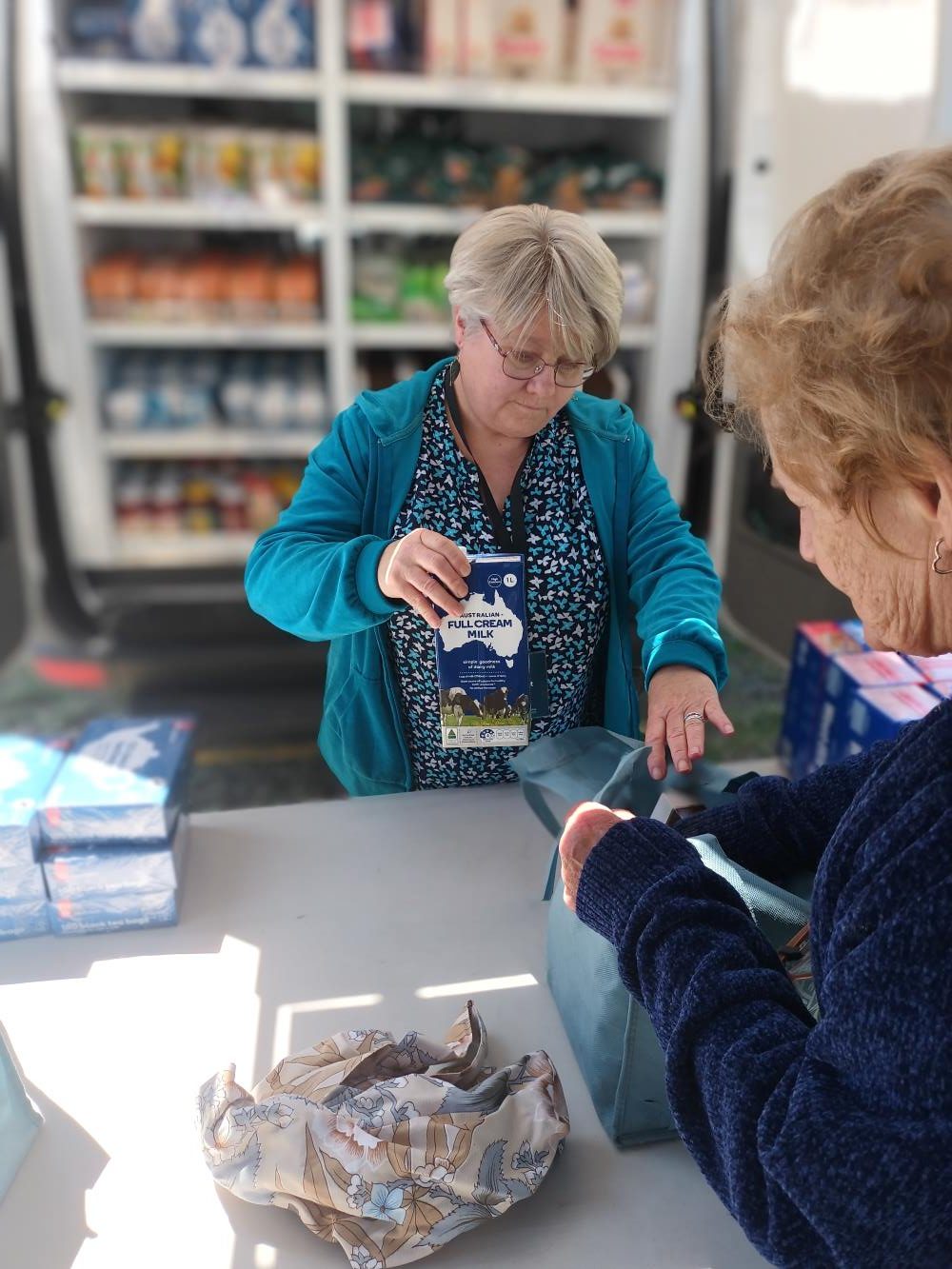
The Pantry subsided food truck at Springwood is more like a local store than a supermarket. (Gabiann Marin)
Other community food services in the lower Blue Mountains
The sense of generosity and community spirit here is wonderful to be part of, although The Pantry is just one of many food reclamation and redistribution projects taking place in the Lower Mountains.
The Springwood Neighbourhood Centre offers free bread, pastries and assorted baked goods each Wednesday and Thursday to anyone who wants it, as well as tea and coffee by donation. All their bakery items come from local bakehouses who would otherwise be tossing them into bins. The Neighbourhood Centre also provides food packages to those in need, which are provided no questions asked and are full of high quality reclaimed and donated groceries and food items.
Winmalee Neighbourhood Centre offers similar programs as well as an open-to-all community lunch, available by gold coin donation each week at the Baptist Church in Springwood. Another community group collects unwanted and day-old items from local bakeries and redistributes them to children in the local high schools, offering the students a free morning tea/breakfast upon their arrival at school.
All these services are facilitated by generous volunteers and community organisations who understand the multiple benefits of food sharing, food reclamation and community gatherings, and want to help ensure that anyone can take part.
Is reclaimed and donated food safe?
While more and more people are discovering the benefits of food redistribution and sharing, there are some who are understandably concerned about the safety of food which comes through these services. The idea that it is spoiled food which should be thrown away however, is a myth.
While it is true that much of this food would have historically ended up in landfill, thrown away by big retailers or food businesses, it is important to understand that it is more often discarded to make way for fresher versions of the same food stuffs, or to make room for other foods on shelves, not because it is unsuitable for consumption.
Only food that has expired use by dates has to be thrown away, yet it is estimated that over 70% of food tossed into waste services is perfectly safe to eat. By rescuing this food before it goes into landfill, organisations such as The Pantry can create sizable improvements in both food stability in local communities and environmental impacts across the world.
Food reclamation and redistribution is great not just for our hip pocket, but for our environment. Foodbank Australia estimates that there are currently more than 7.6 million tonnes of food going into landfill each year. While food waste may seem to create less environmental damage than plastics and hard metal waste, all this food rotting in landfill releases huge amounts of CO2 and methane into the atmosphere each year, contributing substantially to climate change. Furthermore, according to Foodbank, 10% of global greenhouse gas emissions come from food produced but wasted, which in Australia represents 17.5 million tonnes of CO2 every year.

Foodbank Australia estimates over 7.6 million tonnes of mostly unnecessary food waste goes to landfill every year. Photo Creative Commons License
Best Before versus Use By Dates
The main reason food is wasted in Australia is because it is often discarded once it has passed its BEST BEFORE rather than its USE BY or expiration date.
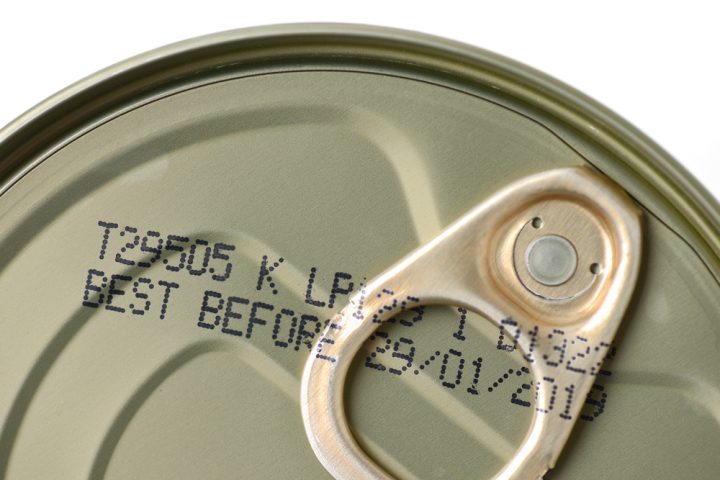
Best Before Dates indicate a food can be safely eaten beyond the date specified. Photo Creative Commons license
A USE BY date on food packaging indicates that a food is perishable and would be unsafe to eat after a specific date due to bacteria or spoilage. It is illegal in Australia to sell or give away food which is beyond its use by date, and such food should never be eaten, so this food will have to be thrown away if not consumed before the date specified.
Charities and community food organisations are required to comply to all the same food safety compliance requirements as any other food provided to the public, which means all donated and reclaimed food must be sold before its use by date. These organisations also have to follow specific storage and handling requirements for perishable foods such as dairy and meat, or fresh food such as fruit and vegetables, exactly the same way any food provider would be required to do, so the food you access through these services is as safe as any you would buy from your local supermarket, bakery or green grocer.
However, most packaged food does not have a USE BY date but is instead stamped with a BEST BEFORE date, which, although often confused with a use by date, actually has a completely different meaning.
Food bearing Best Before dates are not perishable and can be safely consumed for periods beyond the date marked on the packaging. The best before date is used to indicate when the food will begin to lose quality, but beyond that date it is perfectly safe for some time after. These best before dates vary widely, even between brands of the same items, and are determined by manufacturers based on their own estimations and customer feedback regarding quality of taste rather than estimated shelf life, so the actual life of these foods can be months beyond the best before date stamped on their packaging.
Most donated and subsidised food is provided close to or after it’s best before date when commercial food retailers determine it will not be as popular on their shelves.
Exactly how long a food can be safely eaten beyond the best before date can vary but according to the Australian Food Safety Information Council, in the case of dry goods such as Cereals, Flour and Sugar the food is safe to eat up to 10 months beyond its best before date: assuming the food is properly stored and unopened at time of purchase. Foods such as unopened canned goods like soups and baked beans can be safe to consume as long as 14 months beyond the best before date, and some canned foods can be safely stored for over 2 years.
There is no agreed guidelines for how long after a BEST BEFORE date the foods expire, with the Australia Food Authority guidelines simply stating that these foods ‘..can be sold after that date, provided the food is not deteriorated or perished.’ However there are some general guides which have suggested timeframes for different kinds of foods and can provide a good rule of thumb for working out how long a food can be stored and eaten beyond its best before dates.
In the case of donated fresh food, such as vegetables and fruits, these should be consumed 2 – 4 days after purchase or, if frozen immediately, can be stored in a freezer for up to 3 weeks, but should be eaten within 24 hours of defrosting.
Through buying or accessing reclaimed food and then extending the life of food in our pantries and freezers we can enjoy lower grocery bills while simultaneously preventing thousands of tonnes of food from being wasted in landfill, and thanks to organisations like The Pantry, we can build stronger social connections and more resilient communities who are happily making smarter food choices. For, as Justine Jenner points out, we are all looking for ways to make a better world for everyone, but none of this works without community.
“I love the idea of sharing what we have, and not wasting. In order for that to happen we need community around it,’ Justine explains. “Without community how will we know what we can share and what we can save from going to waste? So I think The Pantry goes very closely with community and very closely with caring for each other and also, in the way we do that, we also look after our environment .”
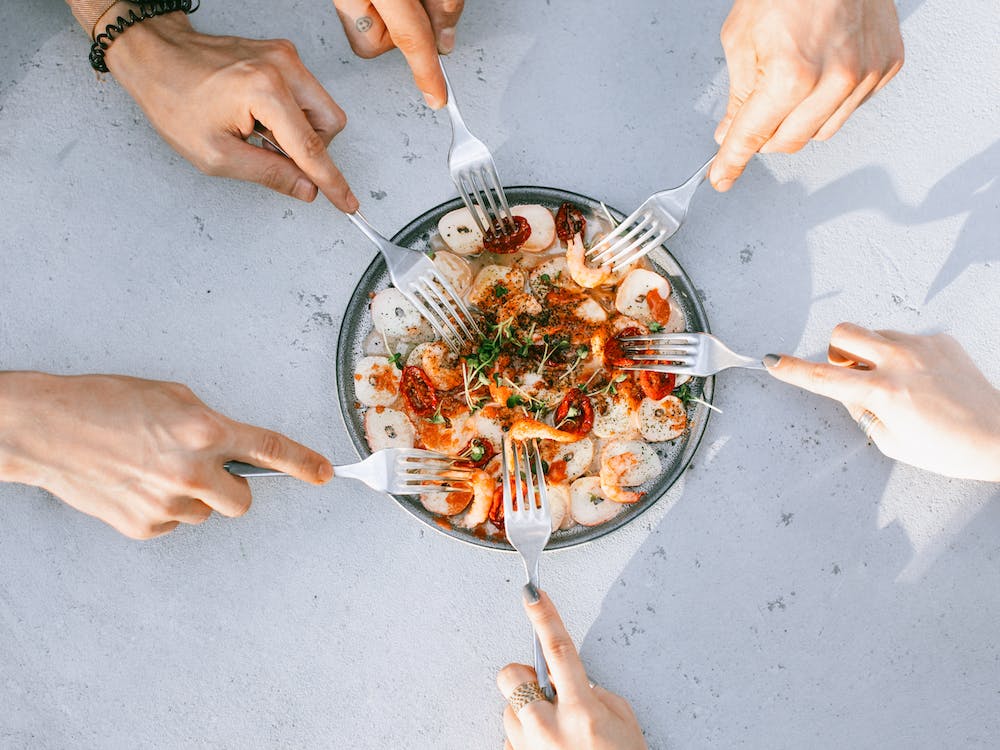
Creating a food sharing and redistribution society is part of the reclaimed food revolution. Photo creative commons license
Take Action:
- The Pantry subsidised supermarket is open to all every 2nd Thursday from 12pm – 1 pm at The Factory, 28 Lawson Road, Springwood, so go along, fill a bag, meet some locals and enjoy a delicious cake or donut.
- If you are a local food business which could donate fresh food or baked goods, please get in touch with Justine Jenner at The Factory in Springwood, whether it is a one off, occasional or continuous donation. Or contact one of the other food services mentioned in the article to see how you can help.
- Home gardeners can also donate additional harvest from their gardens.
- Do not discard food which has a BEST BEFORE date and freeze fresh food and leftovers where possible to avoid creating additional unnecessary food waste.
Share this article:
This story has been produced as part of a Bioregional Collaboration for Planetary Health and is supported by the Disaster Risk Reduction Fund (DRRF). The DRRF is jointly funded by the Australian and New South Wales governments.
